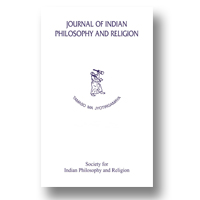|
part - i |
|
1.
|
Journal of Indian Philosophy and Religion:
Volume >
28
Gordon Haist
Derrida’s Différance as Examined through the Thought of Carvaka and Pyrrho
abstract |
view |
rights & permissions
| cited by
Jacques Derrida’s use of “non-concepts” such as the trace and différance shifts the practice of philosophy away from the presuppositions of Western metaphysics, which he sought to deconstruct. This essay contends that this inspires a dialogue with ancient India’s skeptical tradition that flourished from Carvaka to Pyrrho. Following Heidegger’s question of being, Derrida’s deconstruction rethought time, consciousness, perception, etc., in ways that give it a secure footing in ancient skepticism’s usage of epochē, nominalism, etc., to steer between the extremes of nihilism and teleological overdetermination. In both, the meaning of being has to be understood through the “play of the trace,” not the reverse.
|
|
|
|
|
2.
|
Journal of Indian Philosophy and Religion:
Volume >
28
J. Randall Groves
Indianization in Indonesia
abstract |
view |
rights & permissions
| cited by
We typically think of globalization as a modern phenomenon, but globalization in more modest forms occurs much earlier in history. The spread of Greek culture into the Mediterranean and later Europe is one case. The Indianization of Southeast Asia is another, and we can learn from these earlier cases. Just as modern globalization is a mixed economic and cultural phenomenon, so was the Indianization of Indonesia. In this paper I will examine the intersection of trade, religion and art as Indian culture enters Indonesia in the early centuries of the first millennia.
|
|
|
|
|
3.
|
Journal of Indian Philosophy and Religion:
Volume >
28
Catherine Ann Lombard
“The Eternal Stranger Calls”:
The Spiritual Philosophies of Rabindranath Tagore and Roberto Assagioli
abstract |
view |
rights & permissions
| cited by
The spiritual philosophies of Rabindranath Tagore (1861-1941), the Bengali poet and Nobel Prize winner of Literature in 1913, and Roberto Assagioli (1888-1974), Italian psychiatrist and founder of psychosynthesis, are remarkably similar in their fundamental understanding of the relationship between the Infinite Self and the personal self. Tagore and Assagioli met in 1926 during Tagore’s visit to Italy. Both were universalists and humanists, emphasizing action as well as contemplation as essential elements to uniting our finite selves with the Infinite. Despite their diverse cultural inheritances, each one experienced a similar evolutionary process in the formation of their visionary understanding of the transcendental personality of humankind.
|
|
|
|
|
part - ii |
|
4.
|
Journal of Indian Philosophy and Religion:
Volume >
28
Gordon Haist
Derrida’s Trace: Global or Local?
abstract |
view |
rights & permissions
| cited by
Jacques Derrida held that globalization has resulted in worldlessness. The problem is how to work out of its ethnocentric and logocentric cults of power and positioning. Derrida coined the nonword/non-concept “trace” to deconstruct the metaphysics of presence and to assert the universalizing potential of pre-logical heterogeneities, necessary for undermining the binary structure of reasoning. This paper argues that his focus on saving the honor of reason relates across time to Gangesa’s counterfactual reasoning and Bartŗhari’s treatment of Brahman as the eternal word. Given this universalized context, overcoming worldlessness requires reasoning reasonably, not categorically. Reason, Derrida says, must be reasoned with.
|
|
|
|
|
5.
|
Journal of Indian Philosophy and Religion:
Volume >
28
Maria Lehtimäki, Tommi Lehtonen
Globalization’s Effects on the Value Base of the Finnish Core Curriculum:
Perspectives of Cultural Heritage and Cultural Diversity
abstract |
view |
rights & permissions
| cited by
What traits characterize the Finnish Core Curriculum’s approach to globalization? To answer this question, we examine the value base of both the previous and the current curriculum, paying attention to the shift between them. To map the traits, we adopt a two-fold understanding of globalization as something that both enriches and impoverishes cultures and create two perspectives (framings) that view globalization from these extremes. We find out that the aim expressed in the value base has shifted from educating the learner on the diversity of the domestic culture to educating them on intercultural communication skills, paving the way to a supranational culture.
|
|
|
|
|
6.
|
Journal of Indian Philosophy and Religion:
Volume >
28
John Herold
Auteur Michael Powell’s Path to Globalization
abstract |
view |
rights & permissions
| cited by
Michael Powell's "Black Narcissus" (1947) suggests an individualist path, an alternative to progressive diversity as well as cultural resistance to globalization. While the Anglican nuns largely fail because their ideals prevent expression of their needs and desires, Dip Rai is a young non-binary Indian assimilating British values into his own culture as he finds both love and purpose.
|
|
|
|





